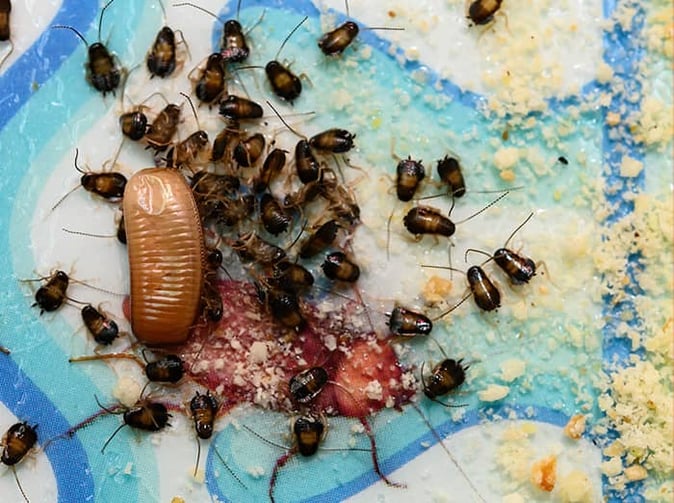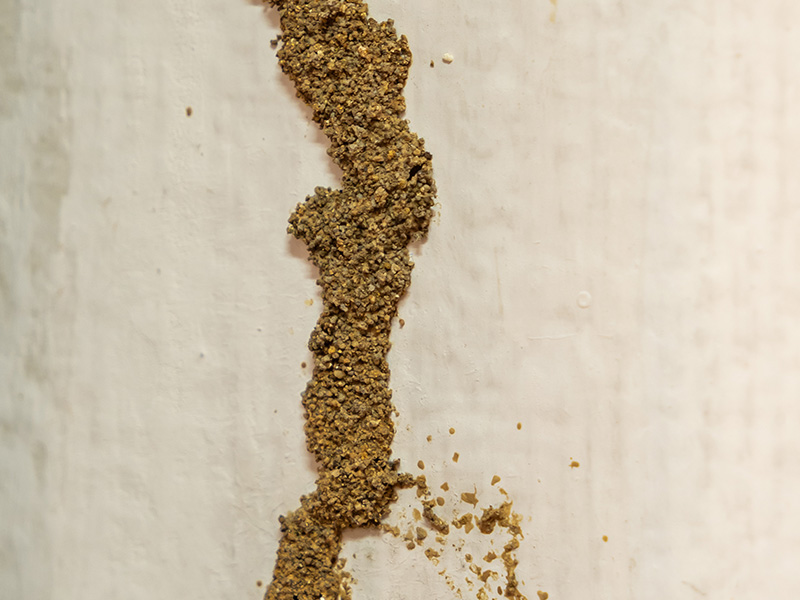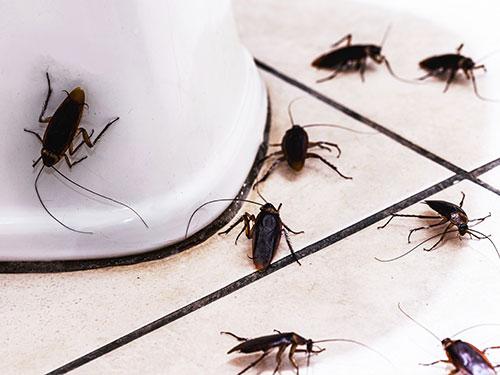Why Am I Seeing Baby Roaches in My Arizona Home?
Spotting tiny baby roaches in your kitchen or bathroom? Unfortunately, it’s not a small problem—it’s a big red flag. Baby roaches (nymphs) don’t show up alone. Their presence means adult roaches are already nesting, laying eggs, and multiplying inside your home.
At Northwest Exterminating, we know how unsettling it is to see even one baby roach scurrying across your counter.
In this guide, we’ll cover:
- What seeing baby roaches really means for your home
- Where baby and adult roaches hide in Phoenix, Tucson & Southern AZ homes
- The most common roach species in our region
- Why baby roaches are so tough to eliminate without professional help
- The health risks associated with a roach infestation
- What to do right away if you spot baby roaches

What Do Baby Roaches Mean for Your Home?
When you see baby roaches, it almost always means:
- Adult roaches are already present and breeding.
- Females are laying egg casings (oothecae) that can contain 16–50 eggs each.
- A hidden colony is nearby, likely inside cracks, behind appliances, or under sinks.
Even if you only see one baby roach, it’s usually not alone. These nymphs will grow into adults and multiply quickly if left untreated.
Where Do Baby and Adult Roaches Hide?
Where Do Baby and Adult Roaches Hide?
Roaches are experts at staying hidden. They prefer dark, moist areas such as:
- Behind or under appliances
- Inside cupboards and pantries
- Around sinks, drains, and plumbing fixtures
- In wall voids, baseboards, or crawl spaces
- Attics and garages for larger outdoor species
Because nymphs don’t wander far from their nests, spotting one in your kitchen means a larger problem is close by.
Common Cockroach Species In Phoenix, Tucson & Southern AZ
Knowing which roach species you’re dealing with helps Northwest Exterminating tailor effective treatments. Here are the usual suspects:
German Cockroaches (Blattella germanica)
The most common pest in Arizona homes, German cockroaches are small, light brown with two dark stripes on their backs. They thrive in warm, humid spots like kitchens and bathrooms. Females produce over 30 nymphs a month, which is why populations explode fast if left untreated.
American Cockroaches (Periplaneta americana)
The largest roaches you’ll find here, American cockroaches are reddish-brown with yellow markings. While they prefer outdoor damp areas, they invade homes when conditions are right. They love crawl spaces and basements and are notoriously difficult to eliminate.
Smokybrown Cockroaches (Periplaneta fuliginosa)
Smaller and darker than the American roach, smokybrown cockroaches favor secluded spots like attics or garages. Their dark coloring makes their heads look almost black.
Oriental Cockroaches (Blatta orientalis)
These roaches are shiny black or dark brown and have underdeveloped wings. They prefer damp, dark areas indoors such as basements or under sinks.
What Attracts Baby Roaches to Homes?
If you’re seeing roaches, something in your home is drawing them in. Common attractants include:
- Food crumbs, grease, and spills left on counters or floors
- Pet food dishes left out overnight
- Moisture from leaky pipes, clogged drains, or standing water
- Warm, hidden nesting spots like cardboard boxes or cluttered storage areas
- Unsealed trash bins and recycling
- Cracks and gaps around doors, windows, and utility lines
Health Risks of Baby & Adult Roaches
Roaches aren’t just gross, they carry risks that can affect your family’s health:
- Allergens: Roach droppings and shed skins trigger asthma and allergies, especially in children.
- Contamination: They crawl through garbage, drains, and sewers, then track bacteria onto your counters and food.
- Pathogens: Roaches have been linked to the spread of E. coli, Salmonella, and other harmful microbes.
Even a few baby roaches are a warning sign of bigger health concerns down the road.
Why Roaches Are Hard to Get Rid Of
Many homeowners try DIY sprays or store-bought traps when they see baby roaches, but here’s the problem:
- Roaches hide deep in walls and crevices where sprays don’t reach.
- Egg cases are resistant to most over-the-counter treatments.
- Nymphs develop quickly, so even if you kill a few, more are waiting to hatch.
- DIY methods rarely eliminate the colony, which is why infestations come back again and again.
Professional treatments are designed to target roaches at every life stage—something DIY sprays simply can’t accomplish.
What to Do If You See Baby Roaches Tonight
Here are some quick steps to take if you spot a nymph in your kitchen or bathroom:
- Clean food sources immediately – wipe counters, vacuum crumbs, and don’t leave dirty dishes overnight.
- Empty garbage and recycling – make sure lids are tightly sealed.
- Check under sinks and around plumbing for leaks or standing water.
- Seal gaps and cracks where roaches could enter.
- Call a professional – DIY can slow them down, but won’t stop the infestation.
FAQs About Baby Roaches
Do baby roaches mean there are more?
Yes. Roaches reproduce quickly, and nymphs only appear if adults are already nesting.
Are baby roaches a sign of a dirty home?
Not always. While food and clutter attract roaches, even clean homes can get infestations if cracks, leaks, or outdoor populations exist nearby.
What should I do if I see one baby roach?
Act quickly. One baby usually means many more are hiding. Professional treatment is the fastest way to stop the infestation.
How Northwest Exterminating Can Help You Win the Battle Against Roaches
If you’re spotting baby cockroaches in your home, it’s time to call the experts. Northwest Exterminating offers proven, effective solutions tailored to Southern Arizona’s unique pest challenges.
What to Expect From Our Service:
- Detailed Inspection: Our licensed pest pros will identify your roach species, find hiding spots, and assess how deep the infestation runs.
- Targeted Treatments: We use a combination of baits, residual treatments, and targeted applications designed to kill roaches at every life stage—from tiny nymphs to adult roaches.
- Prevention & Exclusion: Our Desert Guard service seals cracks and entry points, plus offers tips to remove roach attractants. Prevention is key to keeping your home roach-free long term.
- Ongoing Protection Plans: Roaches are tough to fully eliminate, so we offer ongoing home pest control services that keep roaches and other house-infesting pests out for good.
Don’t Let Baby Roaches Take Over Your Home
Seeing tiny baby roaches or one baby roach isn’t just gross—it’s a warning. These pests multiply fast and are linked to health risks and contamination in your home. Serving Queen Creek, Phoenix, Tucson, and Southern Arizona, Northwest Exterminating is your trusted local partner with the expertise and tools to get rid of cockroaches for good.
Reach out now to schedule your inspection and protect your home from unwanted roach invaders!

Testimonials
Request Your FREE Estimate
Have questions or need help getting rid of pests? Simply complete the form below or give us a call!
Pest Solutions For Homes & Businesses
Northwest Exterminating provides pest control services in the Phoenix metro and Tucson, as well as throughout Southern Arizona, that target pests found in our region's unique desert environment. We promise personalized service and state-of-the-art techniques for all your exterminating needs.
Any Pest, On Time, Guaranteed.



